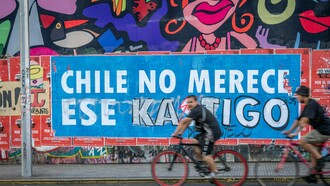India and Pakistan are back in global focus as the two South Asian nuclear-armed neighbors following a deadly terror attack in the Indian union territory Kashmir, where Muslim terrorists shot and killed 26 men, most of them Hindu tourists out on a summer break.
Four militants from The Resistance Front, a little-known offshoot of the proscribed terror outfit Lashkar-e-Taiba, picked Hindu men from tourists who had come from various parts of India to the picturesque Kashmir Valley.
The terrorists then shot the Hindu men at point-blank range in front of their spouses and children on April 23. The terrorists, armed to the teeth with assault rifles, didn’t spare 29-year-old Kashmiri pony man Syed Adil Hussain, who dared to stop them.
India immediately blamed Pakistan for the incident, as the latter has been known to have provided safe haven, training, and resources to Jihadi elements who have been waging a separatist battle for 35 years in the picturesque Kashmir Valley.
Indian Prime Minister Narendra Modi cut short his trip to Saudi Arabia and rushed back to New Delhi, even as the federal interior minister, Amit Shah, flew to Pahalgam to take stock of the situation as the massacre sparked a nationwide outrage and calls for strong retaliation against the perpetrators and their masters, allegedly from Pakistan.
Modi landed in a controversy almost as soon as he returned since he headed to the state of Bihar to address a political event rather than visit Kashmir and meet the survivors.
But even opposition parties that participated in an all-party meeting convened by the federal government offered their support in the operation to track down and punish the perpetrators and their handlers. The entire Muslim community and their leaders and icons, like movie stars and sportspeople, joined the nation in mourning and expressing their outrage.
But none of that helped prevent a steep spike in anti-Muslim rhetoric that has, in some cases, led to roughing up Kashmiri students and poor Muslim men.
A low-level worker of a Hindu nationalist organization in Agra, otherwise known as the home of the Taj Mahal, took to social media declaring that he shot dead a 27-year-old Muslim restaurant worker as retribution for the Pahalgam terror attack. That none of these Muslim victims had anything to do with the terror attack was an immediate warning about the consequences if such sentiments are allowed to spread.
On a brighter side, Kashmiri Muslims hit the streets condemning the terror attacks and emphasized “Hindu-Muslim brotherhood.”
In a first in 35 years of strife, some 16 of which witnessed high-intensity separatist militancy by several Muslim Jihadi outfits, the entire Kashmir Valley shut down, condemning the terror attack. Never before has such unanimity against terrorism been witnessed in Kashmir, either due to support for Jihadi outfits or fear of retribution.
The larger Muslim community reacted with laudable wisdom by immediately condemning the killings as un-Islamic and decrying Pakistan’s perceived support for Jihadi militants operating in Kashmir with alleged support from across the border.
Retaliation
But New Delhi retaliated by suspending a 1960 Indus Water Treaty with Pakistan, closing the main border crossing, downgrading diplomatic ties, and giving 48 hours for all Pakistani visitors to leave India.
Pakistan, which denied any role in the attack, reciprocated with similar border control and visa suspensions and closed its airspace for Indian air carriers. Islamabad described the suspension of the Indus Water Treaty as an “act of war.”
The suspension of the water treaty brokered by the World Bank seems to be merely a caution on paper, at least for now, since it would take years for India to divert the rivers or build more dams to prevent the waters from flowing down to Pakistan.
For now, upper riparian India can deny hydrological data to Pakistan and disallow its experts from visiting the Indian side of the water resource to analyze its management.
Modi told the rally in Bihar that India would hunt down the perpetrators and the conspirators. “India will identify, track, and punish every terrorist and their backers. We will pursue them to the ends of the Earth,” the Indian prime minister, who usually speaks in Hindi or his native tongue, Gujarati, said in English, apparently because he wants the world to listen.
His Pakistani counterpart, Shehbaz Sharif, however, denied any role in the Pahalgam attack but promised to participate in any “neutral” investigation into the incident.
But he cautioned that Pakistan was “fully capable and prepared to defend the country's sovereignty and territorial integrity against any misadventure” on the part of India.
Amid the political dynamics in play between the South Asian neighbors who have at best had frosty relations ever since a painful partition in 1947 that led to the formation of a Muslim Pakistan, the cries of agony echoed from across India from the loved ones of the victims.
Mediation offers
The bilateral tension between two nuclear-armed neighbors who have fought four wars against each other is undoubtedly a matter of global concern, especially with strife zones like Gaza and Ukraine still yearning for peace. Iran and Saudi Arabia, both of which enjoy close ties with India and Pakistan, offered to mediate peace.
Already one of the most militarized zones, Kashmir has for long been a theater of armed militancy for 35 years ever since separatist Kashmiris, allegedly backed by Pakistan, launched an armed rebellion against India to either join the other part of Kashmir, now controlled by Pakistan, or be a part of Pakistan itself.
While the world watched to make sure the matter didn’t spin out of control, especially since India and Pakistan are nuclear-armed neighbors, jingoistic rhetoric dominated in India and Pakistan, where right-wing parties and their supporters let out shrill war cries during public demonstrations against each other.
Unlike in the pre-social media past, terror attacks, especially against Hindus, get amplified with tailored narratives and hate speeches targeting Muslims as a whole in India. The immediate outcome of the Pahalgam terror attack was no different.
Supporters of the ruling Hindu nationalist Bharatiya Janata Party (BJP) targeted even secular and liberal citizens and accused them of emboldening Jihadi groups. No sooner had news broken about the terror attack than social media warriors of the BJP and its allies turned their ire on liberals who advocated secularism, forgetting the fact that secularism is enshrined in the Indian Constitution.
The avalanche of angry rhetoric in WhatsApp groups and social media pages was only reflective of the Hindu-Muslim faultiness that quakes during the aftermath of such violence.
Acolytes of the BJP and its Hindutva (Hinduness) ideology went on a social media overdrive by calling on all Hindus to forget their caste differences to join hands against a common enemy.
A caste is a hereditary and rigid stratification of Hindus. Segregated by thousands of castes that fall into four different groups—priests, warriors, merchants, and laborers or menial workers—it has by far been a massive stumbling block for the all-pervasive spread of Hindutva.
A majority of Hindus thus distance themselves from the Hindutva ideology that feeds the BJP. Hence voices of sanity were not in short supply, as even commoners warned against playing into the hands of the Jihadi terrorists and their masters, who obviously want a communally divided India.
Media diversions
News channels continued with their shrill jingoism. Even the print media focused more on the retaliatory measures than on fundamental questions of fixing responsibility and the lapses in intelligence and security.
Bold statements by the survivors, who lauded the bravery of the local Kashmiris who shielded, protected, and transported them to safety even before the arrival of the security forces, hardly found news space or airtime.
Questions raised by these very survivors about the delay in the arrival of the security forces were either downplayed or simply ignored.
It was left to YouTube channels run by disillusioned journalists who opted out of rhetoric-fueled and jingoistic newsrooms to present a clearer picture of the terror attack, its inevitable bilateral issues with Pakistan, the anti-Muslim rhetoric, and all such binaries that mean more trouble for a society struggling to deal with rising communal tensions.
Kashmiris engaged in tourism activities would be the biggest losers if domestic arrivals from the rest of India stalled. Second only to horticulture, the tourism sector has been on an upward spiral of tourist arrivals that crossed three million in 2024.
But the Pahalgam terror attack threatens to spoil all that. While the valley, especially its borders, has witnessed intermittent attacks against the armed forces, civilians are generally spared. Over a hundred lives were lost to terror incidents last year, while the figures were much higher in the preceding years.
For now, the beautiful Kashmir Valley is mourning along with the rest of India for the 26 innocents killed in the latest act of terror in the country and prays for peace to prevail.















